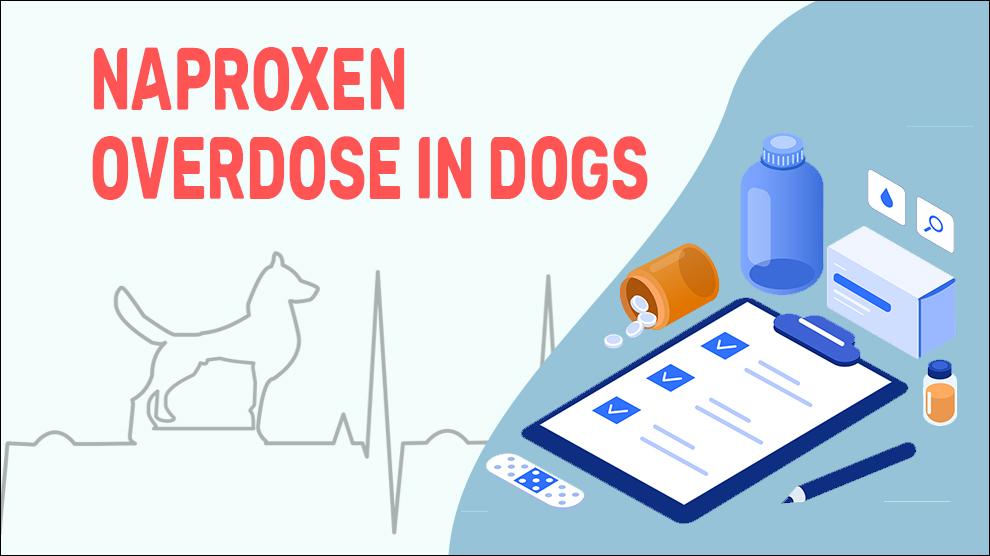Naproxen is an OTC Non-steroidal anti-inflammatory drug (NSAIDs) used as an analgesic and antipyretic to treat inflammation, fever, and pain in humans and dogs. Naproxen has prescribed for dogs typically at a 2 mg/kg dosage of body weight on alternate days. However, many veterinarians do not recommend using naproxen because of potential adverse effects and it is now recommended only if other FDA-approved NSAIDs are unsuccessful.
Like other NSAIDs, naproxen blocks the enzyme cyclooxygenase (COX) to prevent the synthesis of prostaglandins and helps to control fever as well as inflammation responses.
Cyclooxygenase has two commonly known forms: COX-1 and COX-2. COX-1 is considered a constitutive enzyme. Prostaglandins formed by COX-1 protect the normal lining of the stomach. This also helps with filtration in the kidneys and blood flow. COX-2 is an inducible enzyme. It plays a role in the formation of prostaglandins that mediate the inflammation process. COX-2 should be the target for Naproxen but it is a non-selective inhibitor. The Inhibition of the COX-1 enzyme results in ulceration, bleeding in the GI tract, and decreased kidney function.
The US Animal Poison Control Center had approximately 5000 naproxen poisoning cases reported in the last decade, both from accidental ingestion of human medication and overdose of naproxen that was prescribed to dogs. Dosage of as little as 7 mg per kg can cause GI irritation and ulceration, meanwhile, 12-16 mg/kg will cause azotemia, and renal effects, and results in kidney failure.
The most common causes of naproxen poisoning are misuse or off-label use or unintentional usage by the owner (e.g. giving the pet an OTC pain medication used by humans), accidental ingestion from a bottle left open, or a lid chewed off by your dog.
Symptoms Of Naproxen Overdose
Treatment Options For Naproxen Overdose
Pets that ingest excessive amounts of naproxen typically require a three-pronged treatment protocol:
1. Provide anti-vomiting medication (antiemetics)
2. There is no known antidote to Naproxen. Provide supportive care.
- Intravenous fluids and electrolyte support
- Gastroprotectants (sucralfate, misoprostol, antacids)
- Thermoregulatory support (warming)
- Anti-seizure medication (e.g., drugs like potassium bromide, phenobarbital, Levetiracetam, Primidone, etc...
- Blood product transfusions (RBCs, platelets, fresh frozen plasma (FFP), etc)
3. Surgical intervention may be necessary if there is any gastric perforation.
Home Remedies For Naproxen Overdose
Whenever a toxic exposure is suspected, immediate action is recommended. Early consultation and treatment can help prevent serious health effects.
Prevention Of Naproxen Overdose
Check with your vet on the proper medication and the appropriate dosage for your dog.
Always act sensibly and make sure to keep all medications (for people and pets) in a safe place that is inaccessible to pets, if possible in a locked cabinet.
When you're taking medications and you drop any of the pills, don’t leave it on the floor.
Affected Breeds Of Naproxen Overdose
There is no breed disposition
Additional Facts For Naproxen Overdose
Causes:
There are four scenarios that can lead to Naproxen poisoning in dogs.
- Any dose of a human medication
- Overdose of a prescribed medication
- Misuse of prescribed medication
- Off-label use
Sometimes, you may follow the prescription recommendations but can result in an overdose. The pet may no longer require an already prescribed dosage dose of medication in some diseases such as diabetes. Prediction is not possible in this case.
Morbidity:
=5 mg/kg- 7 mg/kg ( gastrointestinal signs)
=10 -20 mg/kg (acute kidney injury)
>25 mg/kg (CNS signs)
Mortality:
Naproxen overdose in dogs is fatal and the mortality rate is actually higher. Worldwide data is not available; however, country-wise data itself suggest medicine poisoning causes high fatality in dogs
Diagnosis:
- Blood pressure, heart function tests
- Urine tests
- Additional tests for kidney or liver
Prognosis:
Prognosis will depend on the ingested quantity, proper diagnosis, and the timing of treatment. Earlier the diagnosis, recovery is good.
Very severe overdoses in dogs can be treated successfully if they get to the veterinarian right away. Mild cases may cause deaths if the poisoning was not found out until the dog succumbs or the cause is unknown.
When To See A Vet
Contact your vet right away, if you notice any of the following:
- Frequent vomiting
- Uncontrolled diarrhea
Food Suggestions For Naproxen Overdose
- Food—offered 24 hours after initiation of treatment
- Start with a Bland diet- White Rice, boiled lean meat such as chicken or turkey;
- Provide veg and fruit smoothies
- After 2 or 3 days, Low fat, low carbohydrate, and high protein meals
- Include protein from lean meats (lean beef), poultry, seafood, eggs, peas, broccoli, spinach, and kale.
Foods to avoid:
- salt-heavy diet
- Avoid dairy products
- No to fried, ultra-processed, Hard or jagged foods (such as Crunchy crackers, chips, etc)
- Hard to digest grains and greasy foods
- No treats or tossing the leftovers
Conclusion
As with any poisoning, proper and immediate diagnosis, as well as aggressive treatments, gives more successful outcomes.
Always act sensibly with your medications and dog’s medications.

















